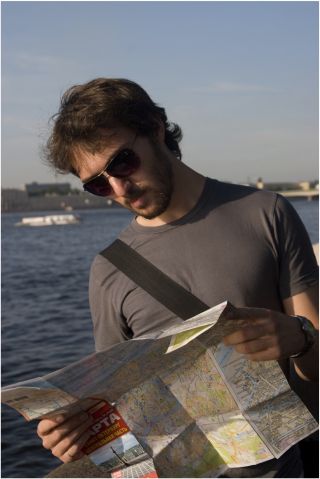Attention
Ten Tips for a Psychologically Rewarding Vacation
When on holiday in a new city, try these tips to tune into your surroundings.
Posted July 6, 2013

Photo Courtesy of Diana Fleming
It’s the time of year when many of us are traveling to new places for a summer vacation. There’s no better time to tune up your psycho-geographic muscles. Here is a list of 10 ideas that might help you to keep looking, learning and exploring on a holiday in a new city. And even if you’re not going away, some of these tips can be used right in your own hometown to enhance your appreciation for your connections with place. The main idea is to shake up your preconceptions (or avoid forming any), leave your auto-pilot behind, and open your senses wide to new experiences.
1. Be Unprepared
This tip will drive many people crazy, but if you’re bold enough to try it you may reap surprising benefits. Most of us do some homework before we travel. We look at brochures, guidebooks, websites and picture galleries. Some of us (I’m blushing guiltily here) may go even further than this, reading up on the history, culture, politics and literature of an area before we visit. In a way, this makes sense. You’ve paid a lot of money for your holiday and you don’t want to come home feeling as though you didn’t see and experience everything. But it can be a very different kind of experience if you deliberately shield yourself from as much foreknowledge of a place as possible. Just go somewhere without any advance research at all and let it hit you in the face! Of course, it’s not safe to use this approach for all destinations, and a little judgment is required, but if you keep your research to an absolute minimum, letting the new setting, patterns of activity and the physical appearances of a place wash over you, you can treat yourself to a delicious dose of culture shock that can shake loose all kinds of new insights and feelings. You can always read the books when you get home.
2. Walk Everywhere
You may not be able to spend every moment of your holiday on foot, nor may you want to, but as much as possible you should try to explore new places while walking. The human perceptual systems are designed to take in the world at a speed no faster than walking pace. Anything faster and you will tune out your surroundings and miss things. Second choice would be a bicycle. Resort to public transit and taxis only when necessary and, unless absolutely essential (Los Angeles anyone?), avoid renting a car unless it’s for a day or two for a special excursion.
3. Look Around
This tip sounds strangely obvious. If you want to see, then look! But many experiments in psychology have shown that, when we walk, we typically look in particular directions and at particular objects (for example, we look at the feet of oncoming pedestrians in order to avoid collisions). We occasionally scan the route directly ahead to be aware of obstacles and risks. On a city street, we pay a great deal of attention to what’s happening on the other side of the street out to about an angle of 30 degrees. Knowing this, try to avoid these attentional sweet-spots and look around. Look straight up and straight down. Look to your direct left. Look behind you. Pay attention to a range of distance scales, looking ahead as far as you can see and also at what is immediately around you. The key is to break down your usual patterns and stay off of automatic pilot.
4. Take a Deliberate Wrong Turn
You may be on vacation, where the prime directive is to have fun, but you don’t leave all of your old needs and desires behind. You still need coffee, band-aids, a new towel for the beach or a cheap breakfast. After a few days in a new place, you will begin to build compact and efficient mental maps of your surroundings, usually composed of familiar routes to the places that fulfill these needs. You know exactly how to get from the hotel lobby to your favorite coffee shop or breakfast place. You know the quickest route to the beach. Here comes auto-pilot! But why not turn these run-of-the-mill errands into opportunities to explore? Shake things up by taking a wrong turn on purpose. If you’re visiting a new place, you are absolutely guaranteed to find something you’ve never experienced before.
5. Leave the Map at Home
The world is filled with maps and guidebooks. Take a day out of your vacation and go rogue. Stop using all navigational aids, including your phone. Don’t make any plans for the day. Just get your comfortable shoes on and walk. With your mind freed from destinations and goals, you’ll be in a much better frame of mind to experience the journey itself. Think of your best vacation moments. Was it that first glimpse of the Arc de Triomphe? The moment you finally arrived inside the Metropolitan Museum of Art? Or was it when you discovered something so unexpected and delightful that you wanted to stay there all day? Chances are, your most cherished memories are of those serendipitous surprises. Leaving the map behind and taking a day for a psychogeographic adventure is one way to increase the likelihood of finding such moments. At the end of the day you can always find your way back home using a taxi or public transit.
6. Stop Moving
Let’s say you’ve read about a fantastic museum that’s only a few blocks from where you’re staying. You’ve consulted a map and you know how to get there. Try stopping. Just pick a random moment on the walk and stop moving. Find a place to sit or lean and just stay still. When we are walking, we see the world in a particular way. Our eyes gravitate to the attentional sweet-spots (see #2). That’s great for merchandisers who might be hoping we’ll buy something, but not so great for simply soaking up the ambience of a place. For that, you need to sit still and open your senses. Don’t move on until you feel like you’ve seen it all. Every street corner can be an epiphany.
7. Embark on a Photo-Quest
Almost everyone likes to take photographs on holidays and for good reasons. We want to share our trip with friends when we get home (or perhaps via social media while we are still traveling). We want photographic souvenirs for ourselves. But the problem with holiday snapshots is that, while we are traveling, the photographs can get between us and what we are seeing. Once in ‘photographer mode’ we tend to see all of our surroundings as if through a viewfinder, and we see the world as a kind of mediated experience. It’s almost as if, rather than being there, we are imagining being there through the eyes of someone else who will eventually see our pictures. Take a day out of your vacation and use your camera only to take photos related to a particular theme, like ‘street-art’, ‘interesting building facades’ or ‘red things’. The object of such a photo-quest is that it will encourage you to see your surroundings in a new way. Rather than searching for the perfect Kodak moment, you will begin looking for more specific objects, and this will open your eyes to the new possibilities of your surroundings.
8. Play with Group-Think
I like traveling alone. In fact, I often think that I’m happier traveling by myself than with others because then there’s no need to compromise. I wake up each day in sole charge of where I will go that day and what I will do. But most of us travel with companions—family members or friends. This can also be great fun, especially if you can avoid the kind of mental gridlock situation where the group ends up doing less than it could because of the inertia of a crowd, all of whom may have different preferences. One way to avoid this is to make a game out of group-think travel. Take some time out of your holiday, perhaps a completely unplanned day, and set out from your home base. Prescribe a rigid order for group decision-making and then stick to it. Instead of having one leader, make sure that each group member takes a turn at making decisions. One very simple way to do this is to simply take turns deciding which way to go at each intersection. Have one group member make the call at each intersection based on nothing more than gut instincts and preferences. Your overall journey will be filled with surprises and everyone in the group will feel that they’ve contributed to the adventure.
9. Ask for Help
One of the best parts of travel can be meeting new people. But how to do it? We can feel intimidated about approaching strangers in new places in spite of the fact that in the vast majority of cases people are only too happy to be approached. One of the best ways to make contact is to ask questions. Your questions can be anything related to the surroundings. “Do you know what this restaurant is like?” “What do people around here usually do on a Sunday?” “Can you tell me where this bus goes?” Don’t be dissuaded if you get a rare surly response—most people are only too happy to tell you things about where they live and they will be pleased that you’ve asked. You’ll learn new things and feel more connected to your surroundings.
10. Pay Attention to All of Your Senses
Human beings are visual animals. Much more of our cerebral cortex is devoted to processing visual information than any of the other senses, and we rely heavily on the visual sense to find our way, explore objects, and gain understanding of the world. Nevertheless, the world is filled with an interesting variety of sounds, smells, tastes and tactile experiences. As you are traveling, try to find occasions to deliberately focus on sensations other than the visual. Listen to what’s happening around you. Take in the smells of the street. Can you identify them? Do you know where they are coming from? Touch things when you can do so safely. Feel the texture of stone buildings. If you are traveling in a group and you don’t mind being stared at a little, you could even make a game of this and take turns wearing a blindfold while being led around on the streets. This experience is guaranteed to open your senses to the world beyond vision where many new insights await discovery.
Follow one or more of these suggestions for a different kind of vacation. You may end up sacrificing one or two of the hot tourist spots but you will gain much more than you lose—a deeper sense of connection with your new surroundings and renewed appreciation for the impact of the places of your life on your feelings and thoughts.
Follow me on Twitter.




